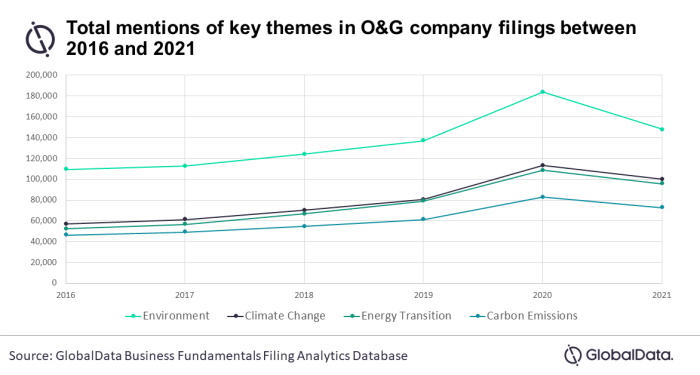

Climate policy is a hot topic in the oil & gas (O&G) industry, with the theme ‘Climate Change’ mentioned over 210,000 times in GlobalData’s Filing Analytics database of global O&G company filings in 2020 and 2021 combined – a 41% increase from the 2018-2019 period. The leading data and analytics company says that climate change policies will continue to be an ever-growing topic of discussion in the industry over the next five to ten years, as well as highlighting that firms in the US have already taken positive steps towards achieving a net-zero emissions goal.
Rinaldo Pereira, Business Fundamentals Analyst at GlobalData, comments: “When looking at key themes being discussed by O&G executives, ‘Environment’, ‘Climate Change’, ‘Energy Transition’ and ‘Carbon Emissions’ are all high up on the agenda.”
GlobalData’s latest report, ‘US Independent Oil and Gas Emissions Reduction Strategies’, reveals that most US independent companies have either acknowledged, implemented, or set specific targets and strategies to combat their emissions output by communicating their plans and initiatives to the public. Other smaller independents, meanwhile, who lack detail of specific targets or strategies tend to keep plans in house.

Justin Allen, Upstream Analyst at GlobalData, adds: “Over the next five to ten years, global climate policy will continue to be an ever-growing topic of discussion. If the US is going to meet its target of net-zero by 2050, it will be crucial for the O&G industry to improve its emissions output over the next 20 to 30 years.”
One of the most common strategies O&G companies are using to combat their emissions output is becoming more efficient during the drilling and completion phase of a well by reducing engine idle times and using more environmentally friendly fuel – for example using electricity from the grid or recycled natural gas rather than diesel fuel.
Most US firms have already implemented the use of vapor recovery units (VRUs), which capture low-pressure emissions from oil and water tanks. Improving leak detection and repair systems will also help provide faster responses and more efficient repairs.Allen continues: “While most companies have committed to becoming net-zero by at least 2050, issues remain, including flaring of natural gas, equipment malfunctions resulting in large oil spills or natural gas leaks, and oil transport accidents.”
Source: GlobalData